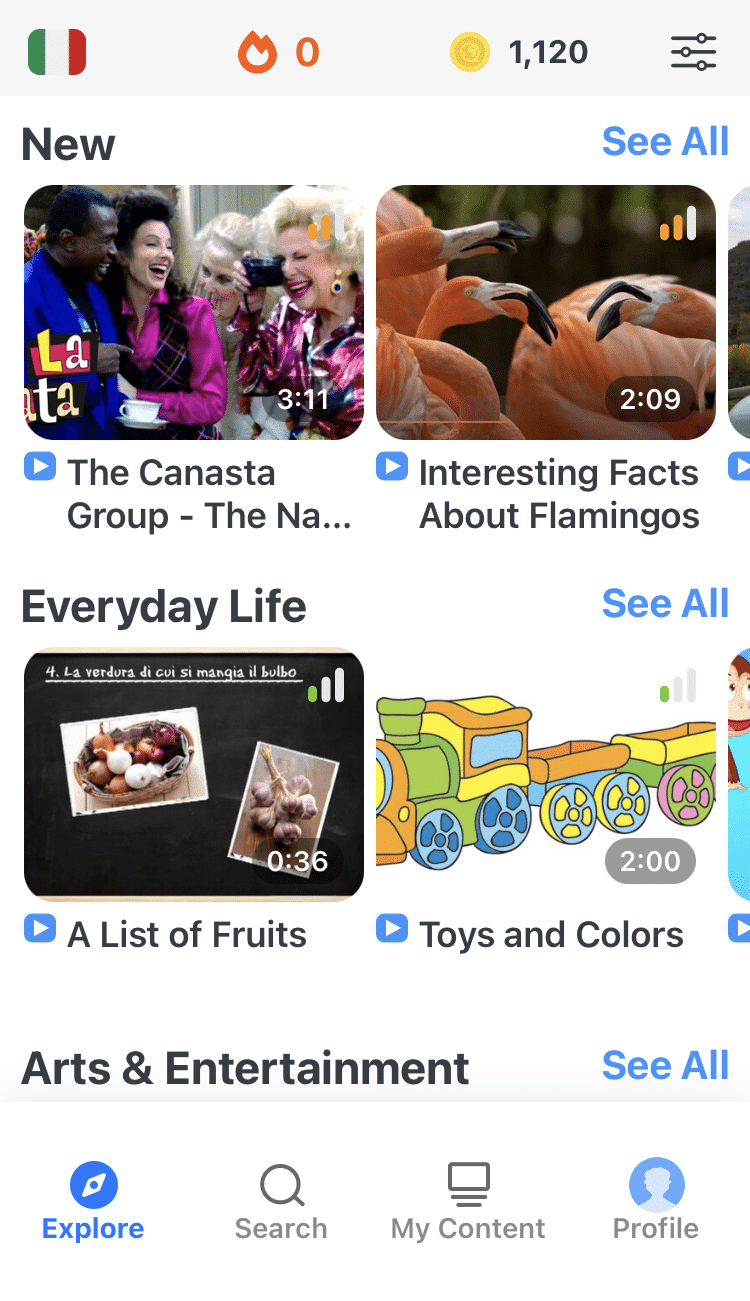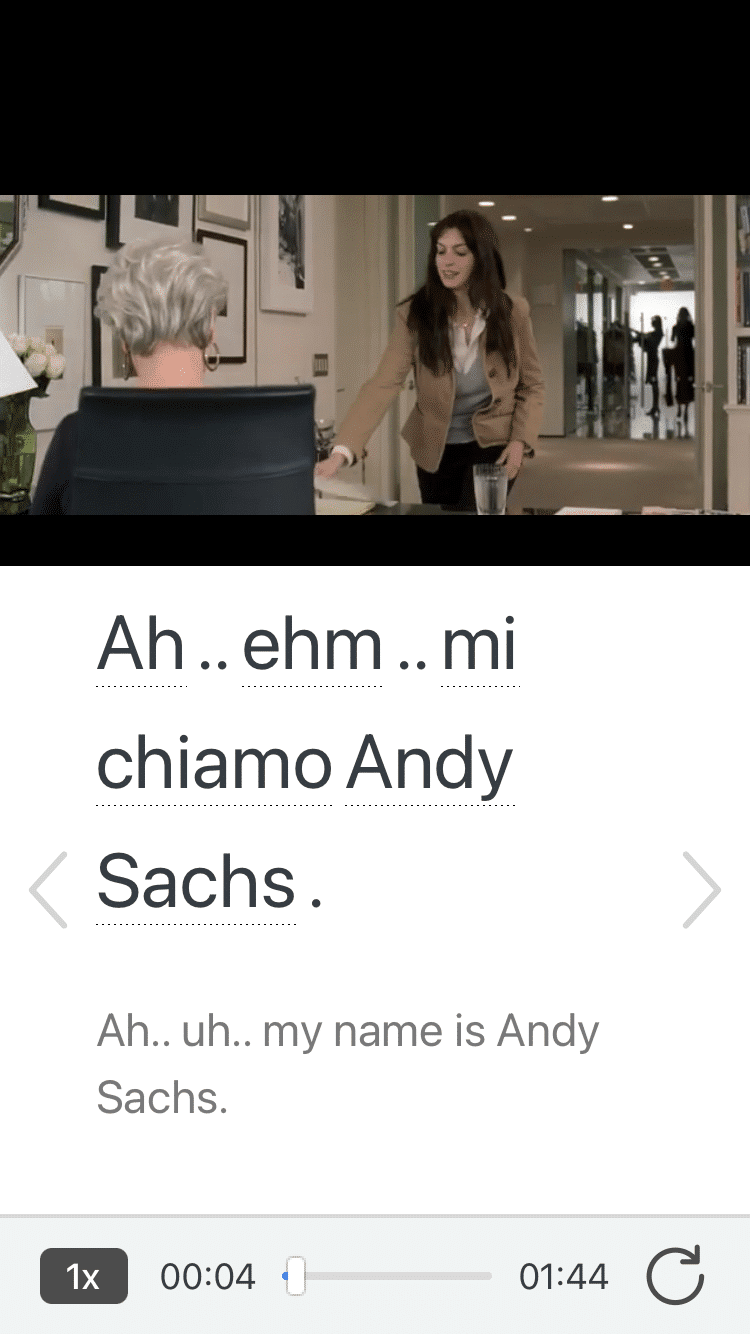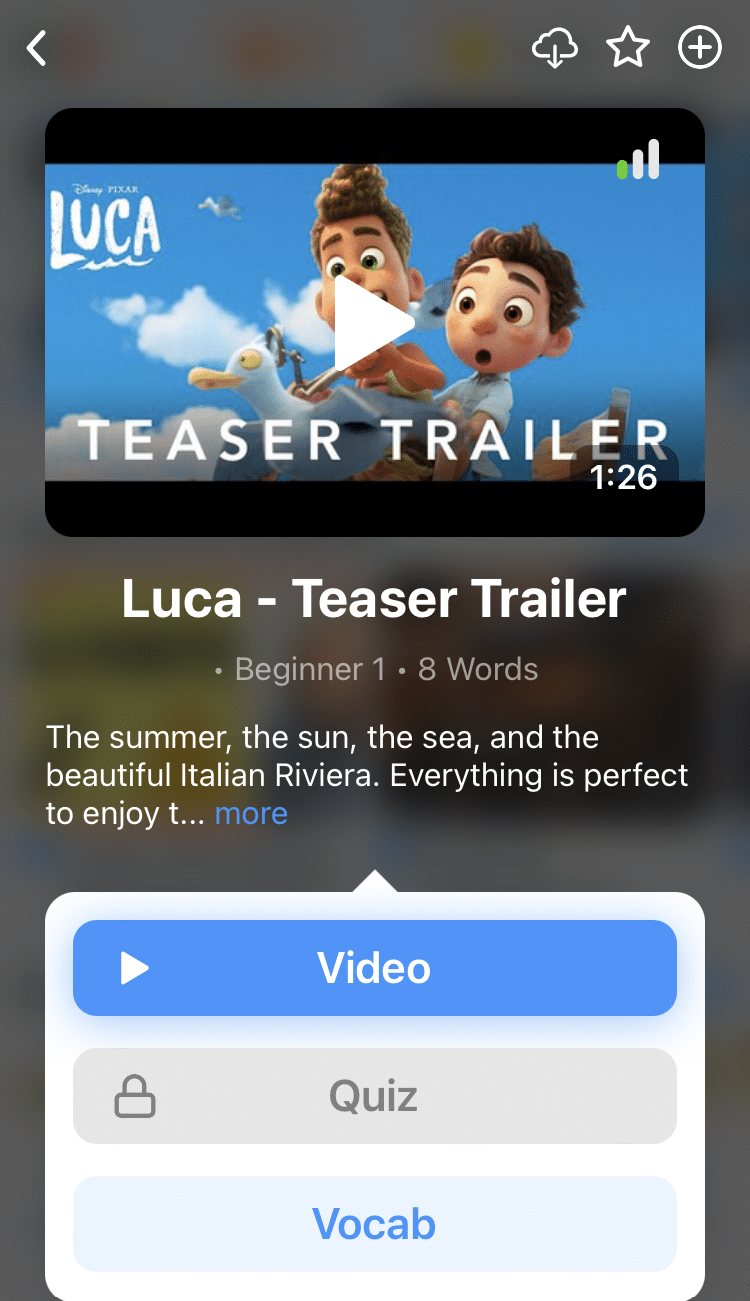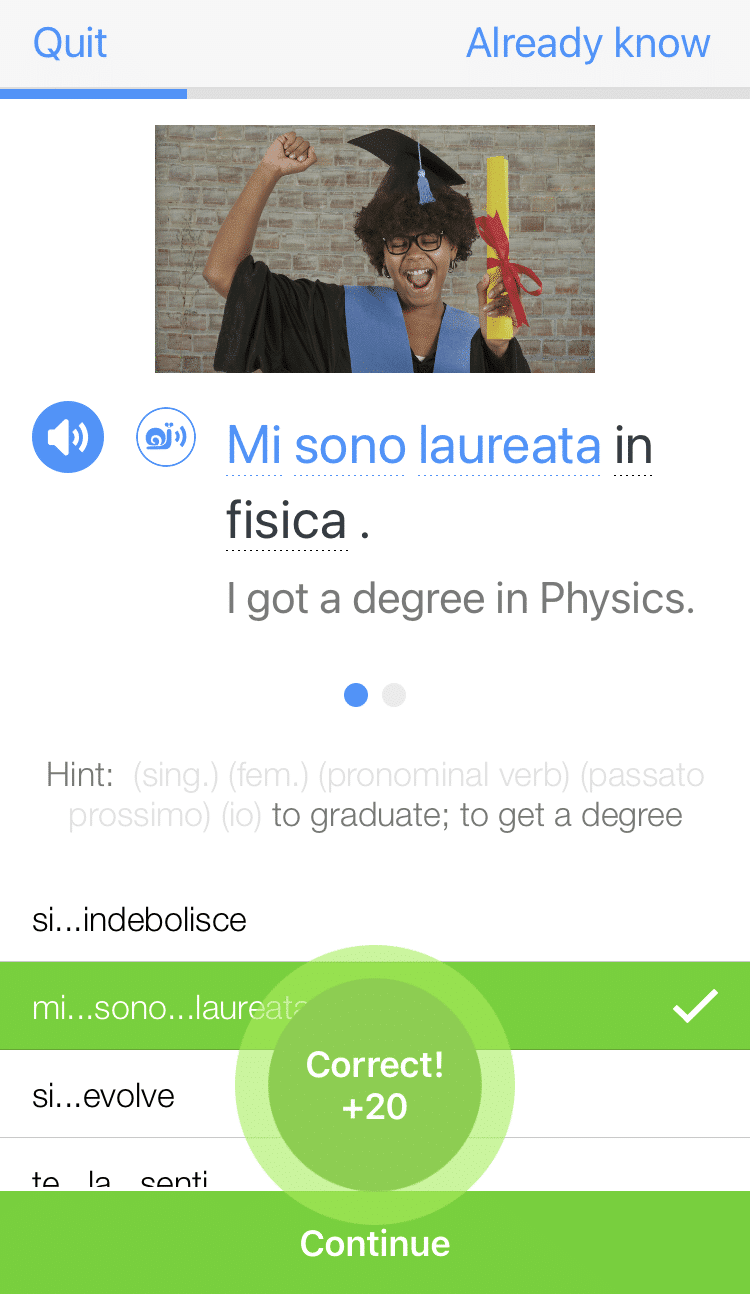
8 Common Ways to Say Good Luck in Italian
There are many situations where you may want to wish someone good luck.
And if you’re learning Italian, learning how to say “good luck” like the natives is essential.
In this post, you’ll learn the eight most common ways to say good luck in Italian, plus how and when to use them.
From the most literal translation to some colloquial phrases, adding these to your vocabulary will boost your ability to connect with and encourage Italian speakers.
Contents
- 1. Buona fortuna (Good luck)
- 2. In bocca al lupo (Into the wolf’s mouth)
- 3. In culo alla balena (In the whale’s ass)
- 4. Auguri (Best wishes)
- 5. Ti auguro buona fortuna (I wish you good luck)
- 5. Che Dio ce la mandi buona (May God be with us)
- 6. Incrociamo le dita (Fingers crossed)
- 7. Buone cose (Good things)
- 8. Toccare ferro (Knock on wood)
- And One More Thing...
Download: This blog post is available as a convenient and portable PDF that you can take anywhere. Click here to get a copy. (Download)
1. Buona fortuna (Good luck)
Buona fortuna is the literal translation of “good luck.” Fortuna is the Italian word for “luck” while buon or buona (good) is often used when you want to greet someone or wish someone well. For example:
Buon viaggio! (Have a nice trip!)
Buon appetito! (Have a good meal!)
Buon compleanno! (Happy birthday!)
Buona notte! (Goodnight!)
The phrase buona fortuna is used to talk about good luck, but it’s actually not used often by native Italians to wish someone luck. That’s because they believe that buona fortuna porta la sfortuna (good luck brings bad luck).
Basically, many Italians think that you could jinx the situation by directly wishing for good luck.
2. In bocca al lupo (Into the wolf’s mouth)
Due to their superstitions, the Italians commonly use this colloquial phrase instead. It’s akin to “break a leg” and can be used to wish someone well before a job interview, exam, etc.
Some people believe that responding to the phrase with grazie (thank you) could actually reverse any good fortune. (Yes, there are a lot of superstitions to navigate!) The common response has historically been “Crepi il lupo” (May the wolf die) or just “Crepi!” for short.
Nowadays, more and more people reply “Viva il lupo” (Long live the wolf) not just because they don’t like the idea of wishing death on a wolf but also because wolves keep their cubs in their mouth to protect them, so it’s seen in a positive way.
Nobody’s really sure where “In bocca al lupo” came from, but one origin theory says it was used to send off hunters going on an expedition. Another says it refers to the story of Romulus and Remus, mythological twin brothers who were raised by a she-wolf.
3. In culo alla balena (In the whale’s ass)
This is a slightly more vulgar way to wish someone luck, most appropriate with close friends and not great for strangers.
The expression assumes a certain kind of familiarity with the person you wish it on—especially when you consider that the standard reply is equally crass: “Speriamo che non caghi!” (Let’s hope it doesn’t poop!).
Again, the origins of this expression are unclear. Some say it first came from the mouths of sailors. Others are quick to point out the Biblical story of Jonah, who was accused of bringing bad luck to a boat that got caught in a terrible storm and was thrown overboard by the crew.
Jonah was quickly swallowed by a whale and lived inside of it for three days until he was delivered to dry land. While we can’t really ascertain this as the source of the expression, it does have some parallels.
4. Auguri (Best wishes)
Auguri can be a catch-all term for when you want to wish someone well. It comes from the verb augurare, which means “to wish” and can be used to mean “Best wishes!”, “Congratulations!” and even “Happy Birthday!”
Here are some more ways to use it:
- Ti auguro successo. (I wish you success.)
- Ti auguro il meglio. (I wish you the very best.)
- Auguri di Buon Natale! (Merry Christmas!)
- Auguri di Buona Pasqua! (Happy Easter!)
Simply say “Auguri!” and the context of the occasion will be taken into consideration. Whether it’s a new job, a big move or a festive holiday, your good wishes will be noted.
5. Ti auguro buona fortuna (I wish you good luck)
This form of wishing someone good luck combines the verb augurare (to wish) with buona fortuna (good luck).
Remember to change the direct object pronoun according to who you’re talking to (ti for someone you know well, le for an elder or someone you don’t know and vi for more than one person).
You can use this phrase in a letter, card or email:
- Ti auguro buona fortuna per il tuo prossimo esame. (I wish you good luck on your upcoming exam.)
- Vi auguro a tutti buona fortuna nel vostro trasferimento. (I wish you all the best of luck in your move.)
- Le auguro buona fortuna nella ricerca del miglior candidato per la posizione. (I wish you good luck in your search for the best candidate for the job.)
Again, just remember that some Italians believe that a direct wish for good luck may actually bring the opposite.
5. Che Dio ce la mandi buona (May God be with us)
You may hear this phrase used by religious Italians, which literally translates to “May God send us a good one.” It’s used in the same way English speakers use “May God be with us,” or just “Let’s hope for the best.”
Rooted in a deep religious and agricultural history, it originated as a hopeful invocation to ensure favorable weather conditions for a good harvest. Farmers would utter this phrase, beseeching divine intervention for a bountiful yield.
Over time, the saying evolved to encompass broader contexts beyond farming, serving as a heartfelt wish for positive outcomes in various endeavors.
Here’s an example of how to use it:
Domani è il grande giorno del mio colloquio di lavoro. Sono un po’ nervoso. (Tomorrow is the big day for my job interview. I’m a bit nervous.)
Non preoccuparti, sei preparato e sei fantastico. Che Dio ce la mandi buona! (Don’t worry, you’re prepared and you’re fantastic. May God be with us!)
6. Incrociamo le dita (Fingers crossed)
This is a familiar expression that embodies hope and anticipation. Similar to the English saying, Italians use it to wish for a positive outcome when someone is awaiting news, results or facing a pivotal moment.
It’s great for those moments when you want to wish someone good luck or express hope for the outcome of your own situation, and it works well in a language that uses lots of expressive hand gestures.
Here’s an example of how it can be used in conversation:
Sto aspettando una chiamata dall’ufficio delle ammissioni dell’università. Sono davvero ansioso. (I’m waiting for a call from the university admissions office. I’m really anxious.)
Capisco come ti senti. Incrociamo le dita, sono sicuro che andrà bene! (I understand how you feel. Fingers crossed, I’m sure it will go well!)
7. Buone cose (Good things)
This phrase is used in a way that means “I wish good things for you.” Another version is Tante belle cose which means “Many nice things.” While they don’t directly mean “good luck,” you can use either of these phrases to wish someone well in various situations.
For example, if your friend is looking for a new apartment or has an important presentation coming up, you can use Buone cose! or Tante belle cose! to say “Good luck!”
Here’s an example:
Ho appena iniziato un nuovo lavoro. (I just started a new job.)
Oh, che emozione! Buone cose! (Oh, how exciting! Good things!)
8. Toccare ferro (Knock on wood)
This phrase is used more to ward off bad luck or negative outcomes rather than wish for good luck, but the intention is similar. It literally means “touch iron,” but it’s used in the same way that “touch wood” or “knock on wood” is in English.
And just like we desperately search for a piece of wood to touch when we use the expression in English, the Italians try to touch iron (or at least a solid object) when they say this.
The expression comes from the superstition referenced earlier that you must do something to avoid bad luck after making a positive statement or prediction.
Here’s an example of how to use it:
Di solito ho le allergie in primavera, ma per ora mi sento bene. Tocco ferro! (I usually get allergies in the spring, but I feel good for now. Knock on wood!)
The best way to master these phrases is to hear them being used by real Italian native speakers. That way, you can commit them to memory and ensure you’re using them correctly.
You can hear these phrases used in Italian movies, TV shows and podcasts. You can also use a language learning program like FluentU.
FluentU takes authentic videos—like music videos, movie trailers, news and inspiring talks—and turns them into personalized language learning lessons.
You can try FluentU for free for 2 weeks. Check out the website or download the iOS app or Android app.
P.S. Click here to take advantage of our current sale! (Expires at the end of this month.)
Use the phrases as often as you can to practice your Italian and hopefully generate some good fortune!
Download: This blog post is available as a convenient and portable PDF that you can take anywhere. Click here to get a copy. (Download)
And One More Thing...
If you're as busy as most of us, you don't always have time for lengthy language lessons. The solution? FluentU!
Learn Italian with funny commericals, documentary excerpts and web series, as you can see here:

FluentU helps you get comfortable with everyday Italian by combining all the benefits of complete immersion and native-level conversations with interactive subtitles. Tap on any word to instantly see an image, in-context definition, example sentences and other videos in which the word is used.

Access a complete interactive transcript of every video under the Dialogue tab, and review words and phrases with convenient audio clips under Vocab.

Once you've watched a video, you can use FluentU's quizzes to actively practice all the vocabulary in that video. Swipe left or right to see more examples of the word you’re on.

FluentU will even keep track of all the Italian words you’re learning, and give you extra practice with difficult words. Plus, it'll tell you exactly when it's time for review. Now that's a 100% personalized experience!
The best part? You can try FluentU for free with a trial.
Start using the FluentU website on your computer or tablet or, better yet, download the FluentU app from the iTunes or Google Play store. Click here to take advantage of our current sale! (Expires at the end of this month.)



